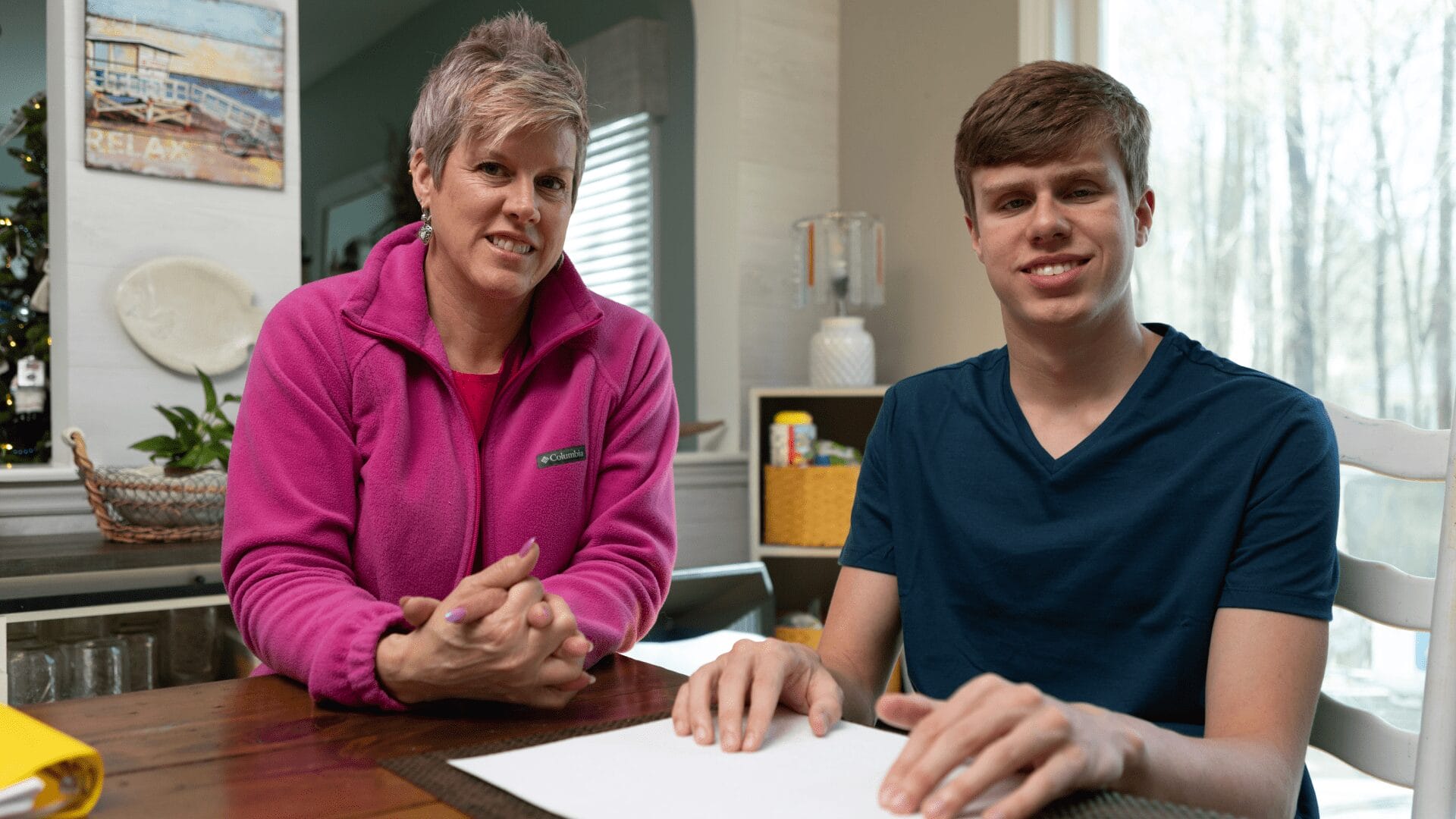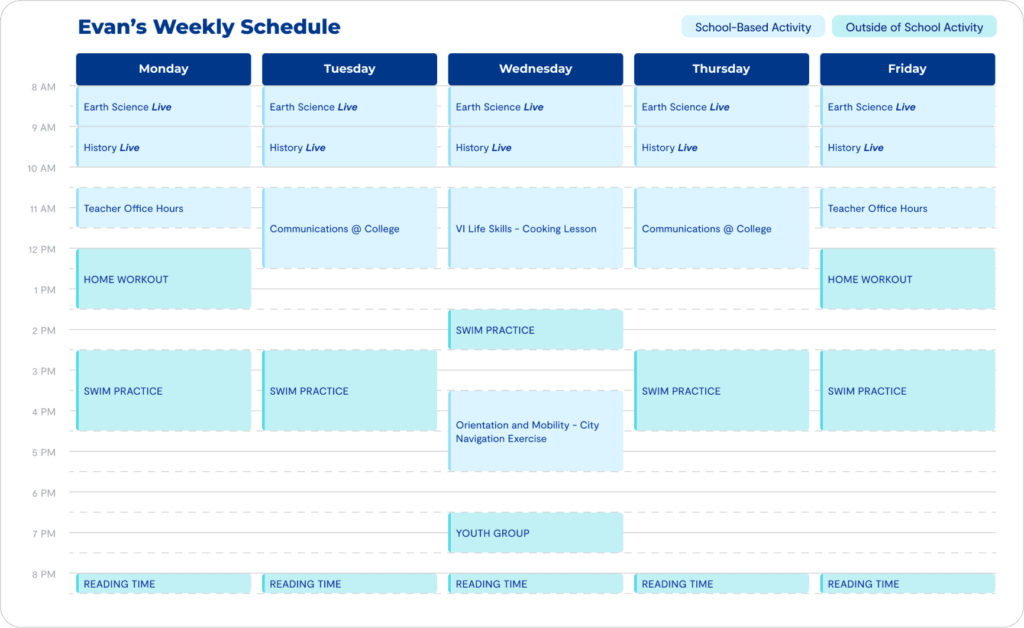10th Grade
Stephen
Stephen’s flexible private school schedule allows room for competitive swimming while rigorous courses prepare him for college.
Enroll today for Fall – start here to secure your spot!
Evan enjoys playing video games and sports with his friends. What sets him apart from other teenagers is he’s a visually impaired swimmer on the national team. Doing public school online gives him extra flexibility for swimming, and he still gets specialized services through K12 to help him learn life skills like cooking and navigating around town.

Traci says her family’s main goal is to make sure Evan develops problem-solving skills for all the things he’ll need as he gets older. Online school helps with life skills and mobility training. A specialized teacher shows him how to do house-related chores as a visually impaired person, and he meets with another instructor downtown to practice navigating streets, sidewalks, and scooters.
Schoolwork for Evan is a mix of scheduled, live classes called Class Connects, self-guided assignments he can complete at his own pace, and specialized orientation mobility training and life skills for people with visual impairments.
A benefit of schools powered by K12 is that educational materials—a computer, textbooks, supplies for offline activities, and more—are provided.

The number of classes students take varies per grade level and individual. For example, students in 11th grade, like Evan, typically take 3–6 subjects each semester, with 2–3 requiring scheduled, live classes.
In addition to core academic subjects, some schools offer dual enrollment where students like Evan can take courses at local colleges for both high school and college credit.
At K12-powered schools, parents (or other responsible adults) act as Learning Coaches for their students. Certified teachers lead class instruction, and Learning Coaches typically spend 1 to 3 hours each day with high school students, providing guidance and oversight. Evan is an independent learner, but Traci, his mom and Learning Coach, is nearby if he needs help understanding a graphic or something in science lab that doesn’t translate well with his screen readers.
Evan’s online school offers dual enrollment. That means in addition to his standard courses, he can also take courses at the local community college. Right now, he’s taking communications to help him be more comfortable with public speaking for his role on the national team He’ll also receive both college and high school credit—it’s a win!




Traci: With Evan and his sister Olivia being visually impaired, the biggest thing for them is always independence. Their brick-and-mortar school was almost helping them too much; we wanted an option where they’d be learning how to be more independent while at school. They needed to learn how to problem-solve on their own more.
I knew I didn’t want traditional homeschool; that would have been too much for me to take on. So, an online school with curriculum taught by certified teachers was a great alternative.
Evan: My sister had already switched, and I felt like it sounded like a more flexible option for me. And one that still had the provided tools for being visually impaired like screen readers, braille displays, and orientation mobility training.
Evan: I really like the flexibility. I can do coursework early in the morning before swim practice or later in the day after my other activities and as long as I’m meeting the deadlines, it’s cool with my teachers.
Traci: I like how doing school online prepares the kids for the structure of how doing college works. They’re learning to manage their time, be responsible for their own deadlines, and prioritize all their activities, from assignments to practices to time with friends.
Traci: I was a little nervous at first about how the new structure would work. After the first few weeks of settling in, though, we found our rhythm, and it was great.
Traci: The teachers have been great. Even if they’re not familiar with accommodations for students with visual impairments, they dive in with us to learn and get up to speed pretty quickly. Evan’s visual impairment teacher is fantastic. She comes to the house to teach him life skills like laundry and cooking.
Evan: The teachers keep classes exciting. I really enjoy my mobility class where I get to go into the city and learn how to get around on my own. I’ll be given assignments like “go find this coffee shop and find your way back to the train station.” It can be challenging especially with the scooters people leave on the sidewalk, but I really enjoy the challenge.
Evan: Swim practice is when I’m most social with my teammates and that’s my main form of training. Some of my friends who are also visually impaired get together to play video games. They have adapted versions that are full audio or accessible so we can all play together. We do coding projects together sometimes too.
Traci: Evan has friends through swimming, of course, from church youth group, and he has other friends who are also visually impaired, and they have calls to talk and play games. When Olivia was in online school, she had friends from band.
Evan: I’m taking dual enrollment classes right now where I get high school and college credit. That’s putting me ahead of the curve a little bit on whatever I chose after graduation.
Traci: I do! The kids are doing school on a computer which is just like college. They’re learning computer skills, how to communicate with their teachers in that kind of environment, and for my oldest, Olivia who’s in college now, they even use the same online platform for courses. She’s doing great.
Evan: I was really surprised with the level of interaction I had with my teachers. I assumed I’d be in my own little bubble online, and I was wrong. The teachers email us a lot, and they’re available for questions, there’s a lot of one-to-one interaction compared to what I was used to at my old school.
Traci: We had friends with another visually impaired child who went to online school and had heard it really worked for them. We switched Olivia first, and then when it worked so well for her, Evan wanted to switch too.
Evan: If you’re on the fence about it, just do it. Sometimes, change is good. I was a little worried about switching at first, but now you couldn’t pay me to go back.
Traci: Stay organized; make your calendar. Make sure each kid has their own working space. Having that organization and structure helps everyone know what to anticipate next.
From kindergarten to high school, K12 provides tuition-free online education that empowers students to learn in ways that work for them. Browse options in your state to find the perfect fit for your family.
These are the stories of real students attending K12-powered schools and their families. Content is a combination of direct quotes and summaries from interviews. Their stories each reflect their experiences at their respective schools. Actual experiences can vary by student and school. These pages are designed to reflect a typical day in the life of a student attending an online K12-powered school. Individual class schedules and requirements will vary by state, school, and the individual needs of each student. Course materials vary, and certain schools may not provide computers or may have specific requirements for providing equipment.